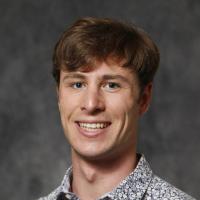CRB Trainee Spotlight: Rylan Watkins (Musier-Forsyth lab)
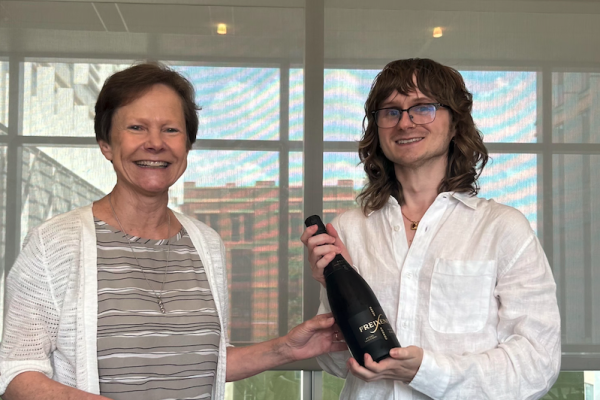
CRB Trainee Spotlight: Rylan Watkins (Musier-Forsyth lab)
Written by Andrew Savidge (Nakanishi lab)
Over the past five years, Rylan Watkins has been hard at work in the Musier-Forsyth lab. Just last month, he defended his PhD. His perspective, especially as federal budget cuts continue to impact scientists everywhere, is unique. Catch up with Rylan’s reflection on his PhD and dreams for the future in this Ribo News Alert trainee spotlight.
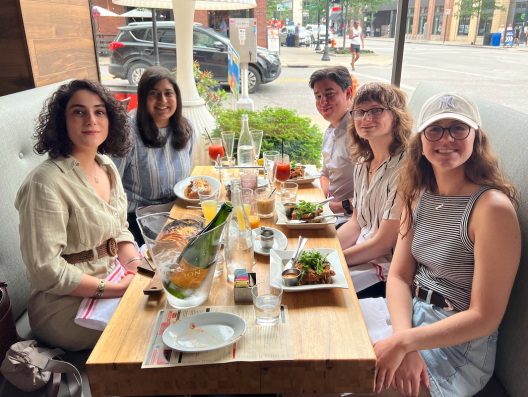
Rylan Watkins is the Musier-Forysth lab’s newest PhD holder. While the title of “Dr. Watkins” might feel jarring to him, he is no doubt a worthy recipient.
Before pursuing his PhD at OSU, Rylan spent most of his life in Florida, where he developed a passion for the life sciences and obtained his bachelor’s in biochemistry from the university of Florida. When he joined the Chemistry and Biochemistry PhD program OSU in 2020, he settled seamlessly into the Musier-Forsyth lab, a place he felt would allow him to grow as both a scientist and an educator. Over his research journey, he has published two articles and one review that highlights his impressive efforts as an RNA biologist.
Rylan’s work centers around aminoacyl-tRNA synthetases, the proteins that attach amino acids to their corresponding tRNAs. Though this function is fundamental to all organisms, these molecular machines are relatively error prone. Since many amino acids are of similar size, some tRNA synthetases are prone to adding an incorrect amino acid to their cognate tRNA. For example, the alanyl-tRNA synthetase might add a glycine or serine instead of an alanine. To counter this issue, organisms have evolved proteins that identify mischarged tRNAs and remove the incorrect amino acid, a process known as tRNA editing.
Many organisms form multi-aminoacyl-tRNA synthetase complexes (MSCs) that also contain editing and scaffolding proteins. However, how these factors work together with the synthetases in each MSC is not fully understood. Rylan’s first paper, “Trypanosoma brucei multi-aminoacyl-tRNA synthetase complex formation limits promiscuous tRNA proofreading” (Frontiers in Microbiology, 2024), covers the role of the protein MCP3 (MSC-associated protein 3) found in the parasite T. brucei’s MSC. MCP3 was once thought to be nothing more than a scaffold on which several synthetases would assemble. However, Rylan showed that MCP3 was critical for preventing the incorrect addition of alanine to tRNAPro in this organism.
Rylan’s most recent paper, “Unexpected enzymatic function of an ancient nucleic acid-binding fold” (Nucleic Acids Research, 2025), characterizes another protein of unknown function called MCP1 in the T. brucei MSC. While MCP3 has a similar predicted structure to other known tRNA-editing proteins, MCP1 does not. Instead, it contains an oligonucleotide binding (OB) fold, a domain that places it in a different protein superfamily than all other known editing enzymes. Surprisingly, Rylan found that this OB fold not only enhances tRNA binding to the T. brucei MSC but enables efficient tRNA editing. This finding was so novel that the editors designated the paper as a “NAR Breakthrough Article”.
Rylan’s findings have advanced the field of tRNA biology by demonstrating how each component of an MSC can contribute in unexpected ways to its function. In broader terms, he has expanded our conceptualization of why MSCs form. Many organisms can still charge tRNAs and synthesize proteins without assembling an MSC- so why are they so abundant across all domains of life? Rylan hypothesizes that components like MCP1 and MCP3 have multiple functions outside of this complex but come together with tRNA synthetases during critical moments of environmental stress. For example, T. brucei changes hosts twice over its lifecycle, and it must endure a fluctuation in the amino acid pool each time. MCP1 and MCP3 assure only the correct cognate amino acid and tRNA pairs are formed, despite the potential increase in mischarging events.
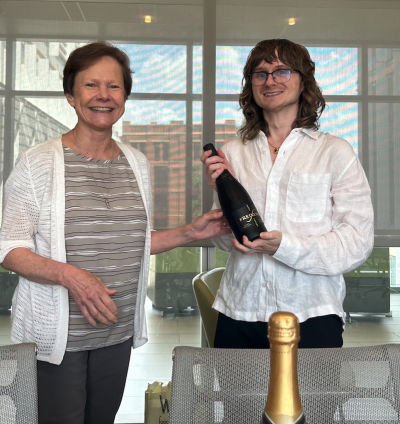
Joining the Musier-Forysth lab has given Rylan more than publications, though. Rylan says he is grateful for Karin’s consistent mentorship that allows him to complete his projects at a flexible pace when he gets overwhelmed. He also talked excitedly about the opportunities he was given to mentor undergraduates, which helped break him free from a rough period in the lab. This positive experience also firmly cemented his passion for science education. He fondly remarks, “It’s nice to have a space where [I] can talk about life and science problems that are low stakes.”. He says that as a PhD student, these small daily interactions are sometimes the things that keep you afloat mentally. Rylan encourages all students to find a lab where you can vent to the people in the office that can empathize with you when life inevitably becomes stressful and, in his words, “not so great”.
But the inevitable nature of this stress is something Rylan thinks shouldn’t be perpetuated in generation after generation of PhD graduates. While it is guaranteed that conference deadlines and defenses will make even the most stalwart scientist anxious, he says the average day as a graduate student shouldn’t feel bleak. He insists that “the work can wait”, and if you are focused during standard working hours, and communicate expectations with your PI, it is entirely possible to “live a little” outside of the lab. Rylan does his best to encourage others to make space for themselves as well as research, but he thinks the current system is unhelpful to struggling students. Despite initiatives pushing for mental health in academia, they often leave the burden on the individual to not self-destruct in the face of ever-rising productivity standards.
Since Rylan defended his dissertation (which I have heard was excellent!), he has dedicated his energy to finding careers where he can teach academics to live a more balanced life. Rylan has since applied to a variety of jobs in education and scientific advising where he believes his talents will be best used. However, because of the recent federal budget cuts, the job market has been oversaturated with experienced scientists. Though his true passion is to be an educator, Rylan says he will likely accept a postdoctoral position for now to make him more competitive. When asked about his dreams outside of science (should the world completely fall apart), he said he’d like to give back to the places where he feels the most nurtured outside of lab. “Maybe I’d start my own mobile coffee shop”, he said while staring at the ceiling. “Or something where I could live my life and tell stories about what I did here”.
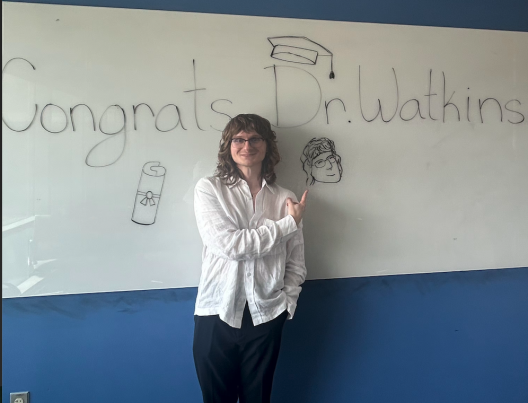
Rylan has lived the quintessential PhD experience at OSU, but one that is uniquely his. He joined a supportive lab, worked hard to expand his field, and ultimately became an independent scientist. Over the time Rylan has spent in this world of RNA, he has developed as a person, though he says he hasn’t noticed any changes in his mentality since his dissertation. This seems to be a common sentiment amongst newly vetted PhDs. After all, they spend 5 to 6 years making incremental progress, and then one day, their committee decides they are ready to move on. The race is suddenly over, and now there is a “Dr.” in their name that recognizes their efforts. But Rylan has clearly grown. He has learned to process vast amounts of information into something testable, something tangible and measured. He has lived within a stressful and often overwhelming world for five years, and developed ways to move through it while being kind to himself and others. And, ultimately, he has become a genuine authority to his peers. Soon, he will spread the knowledge he gained here- his very way of being- to a new group of people. Rylan’s calm confidence about science, and about life, showed clearly when we spoke last month. The world has no doubt grown because of his efforts. And it will welcome Dr. Watkins with open arms, wherever he might go next.
Include DOI/citations in the article for more visibility?
https://doi.org/10.3389/fmicb.2024.1445687 (paper 1)
https://doi.org/10.1093/nar/gkaf328 (paper 2)

